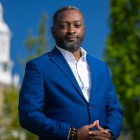
Emmanuel Frimpong Boamah
PhD
Emmanuel Frimpong Boamah (PhD) is an associate professor in the Department of Urban and Regional Planning, and an affiliated faculty member with UB's Community for Global Health Equity. He is trained in urban and regional planning and institutional economics. His work seeks to understand and reform the planning processes and institutional structures (laws, norms, values) that impede and ‘weaponize’ planning interventions against historically marginalized communities. It straddles two overlapping foci. The first seeks to identify the institutional drivers of land, water, food, and housing inequities in sub-Saharan Africa and the United States. The second aims to reform these drivers by advancing polycentricity as a framework for designing flexible and learning-based planning institutions. Both foci ascertain the need for institutional analysis in planning—‘institutional sequencing’—to identify the ‘nucleotides,’ or building blocks, of institutions and their societal impacts. He employs mixed-methods in this research, including social network analysis and modeling, and systems dynamics.
Emmanuel has published in some of the world’s leading planning and cross-disciplinary journals, including Planning Theory, Urban Studies, Planning Theory and Practice, Land Use Policy, World Development, Applied Geography, Environment and Planning: C, and Big Data and Society. He currently advises and works with the World Health Organization’s Urban Health Unit to develop an implementation toolkit with case studies for communities and governments as part of the recently launched WHO Housing and Health Guidelines. He is currently (beginning 2021) a board member of Buffalo Niagara Waterkeeper.
I am trained as an interdisciplinary scholar..when I think of water I think of land, and when I think of land I think of food. These three things go hand in hand.
- Emmanuel Frimpong Boamah at a panel discussion entitled Research for The Common Good, sponsored by the the UB School of Social Work April 4 , 2018
Education
- PhD urban and public affairs (urban planning, public policy and sustainable development), University of Louisville
- MUP, Minnesota State University, Mankato
Selected activities, honors and awards
- ACSP Junior Faculty of Color Fellowship, Harvard University, 2019
- Outstanding Faculty Award, UB Graduate Student Planning Association, 2019
- National Center for Faculty Development and Diversity, University at Buffalo, 2018